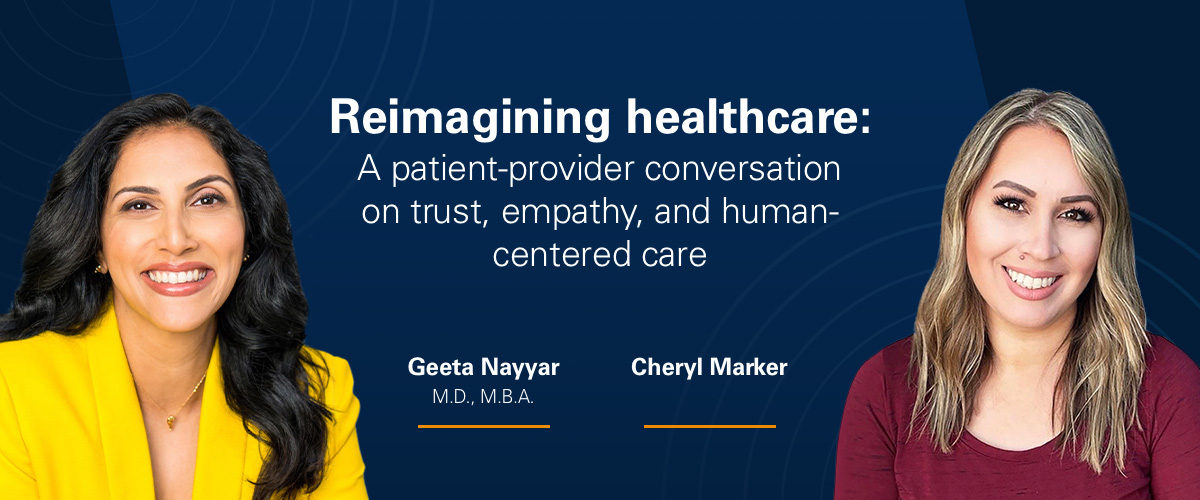Reimagining Healthcare: A patient-provider conversation on trust, empathy, and human-centered care

In a recent engaging and thought-provoking webcast, NRC Health hosted two healthcare leaders for a patient-provider conversation on trust, empathy, and human-centered care. Dr. Geeta Nayyar, MD, MBA, and Patient Advocate Cheryl Marker explored patients’ pressing questions and concerns about their experiences with physicians and healthcare systems.
The duo discussed the significance of building a strong patient-physician relationship, addressing the changes needed in the healthcare system, and envisioning a brighter future for healthcare through the eyes of both the patient and the provider.
Here are their top three highlights:
1. Physician Overwork and Communication Challenges: Marker says that in her experience, timely communication became a challenge, affecting follow-up appointments and the ability to address chronic pain effectively.
“I think I’m fortunate enough to have found an amazing physician, but with an amazing doctor, she has a ton of patients,” Marker says. “It becomes hard to get in to see her in a timely manner, even for a follow-up. And when you’re in chronic pain, three to four months can seem like an eternity.”
Dr. Nayyar says that while the focus should be to elevate a patient-centric system, we can’t forget the physician experience and how the physician/patient experience is connected.
“We’re living in an era of physician burnout and a post-pandemic staff shortage,” she says. “If the physician is having a poor experience, they can’t be expected to deliver a fantastic patient experience. So many of the tools we’ve been given, which are supposed to be an asset, tend to be a detriment. We often create our own workaround for the existing systems. The biggest issue in the healthcare system is this disconnect between healthcare delivery and those who make decisions. So much of the buzz in the industry with AI is all about replacing—but instead, it’s about augmenting the patient-physician experience by removing the administrative burden.”
2. Building Trust and Empathy in Patient-Physician Relationships: Marker emphasizes the importance of the initial connection between patients and physicians, particularly in chronic illnesses. Trust is built through a warm welcome, good bedside manner, active listening, acknowledging and validating the patient experience, and addressing the common issues of medical gaslighting.
“Most patients want to feel acknowledged and validated,” Marker says. “That first connection is crucial. Empathy goes a long way in making the patient feel seen and heard.”
Nayyar suggests that understanding the patient beyond their medical condition, acknowledging past challenges, and recognizing the human aspect fosters trust and strengthens the patient-physician relationship.
“Trust is important,” she says. “The holy grail for both physicians and patients is personalized medicine coupled with human understanding. If you don’t have human understanding, you’re lost at the door—you’re lost at ‘hello.’ That is really, really, really critical in asking those questions. That comes down to knowing your patient inside out,” Nayyar says.
3. Patient Empowerment and Access to Information: Marker discusses the prevalence of patients turning to online resources, due to a perceived lack of information being given by healthcare providers.
Finding reliable online resources is important—but so is the risk of obtaining misinformation. Marker wishes better resources could be available from physicians, including information about diagnoses and the availability of support groups.
“Patients turn to Google because they’re not getting resources from healthcare providers,” she says. “It’s important to remember that they’re yearning for more information about their diagnosis. Like Dr. G said, with AI technology, there’s great potential to provide accurate information and support.”
Additionally, mental health aspects related to chronic illnesses are very real to patients, and Marker says there’s a need for increased awareness, support, and resources for patients to deal with mental health challenges.
“Mental health is often overlooked in chronic illness, and there’s a need for more awareness and support to prevent drastic outcomes,” she says. “Personalizing the experience comes with a full health assessment and going over the patient’s preferences. Involving the patient in the decision-making of their treatment options is crucial for a personalized approach—something that isn’t seen very often, but is vital for effective healthcare.”
Catch the full webcast on-demand!
Dr. Geeta Nayyar, MD, MBA, is the author of Dead Wrong: Diagnosing and Treating Healthcare’s Misinformation Illness.
Cheryl Marker is a patient advocate and healthcare influencer. She creates content on her “Dear Chronic Pain” platform.

